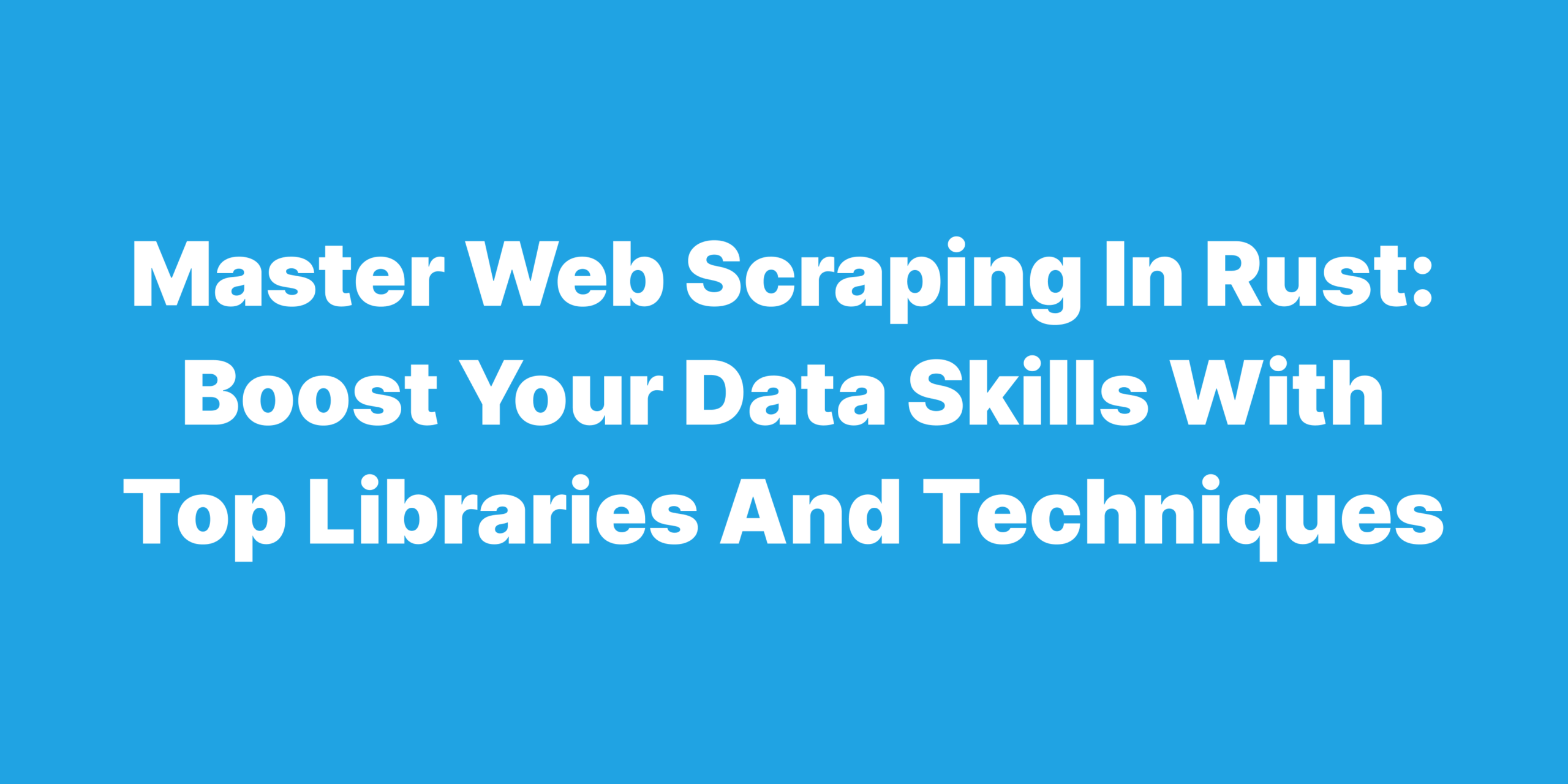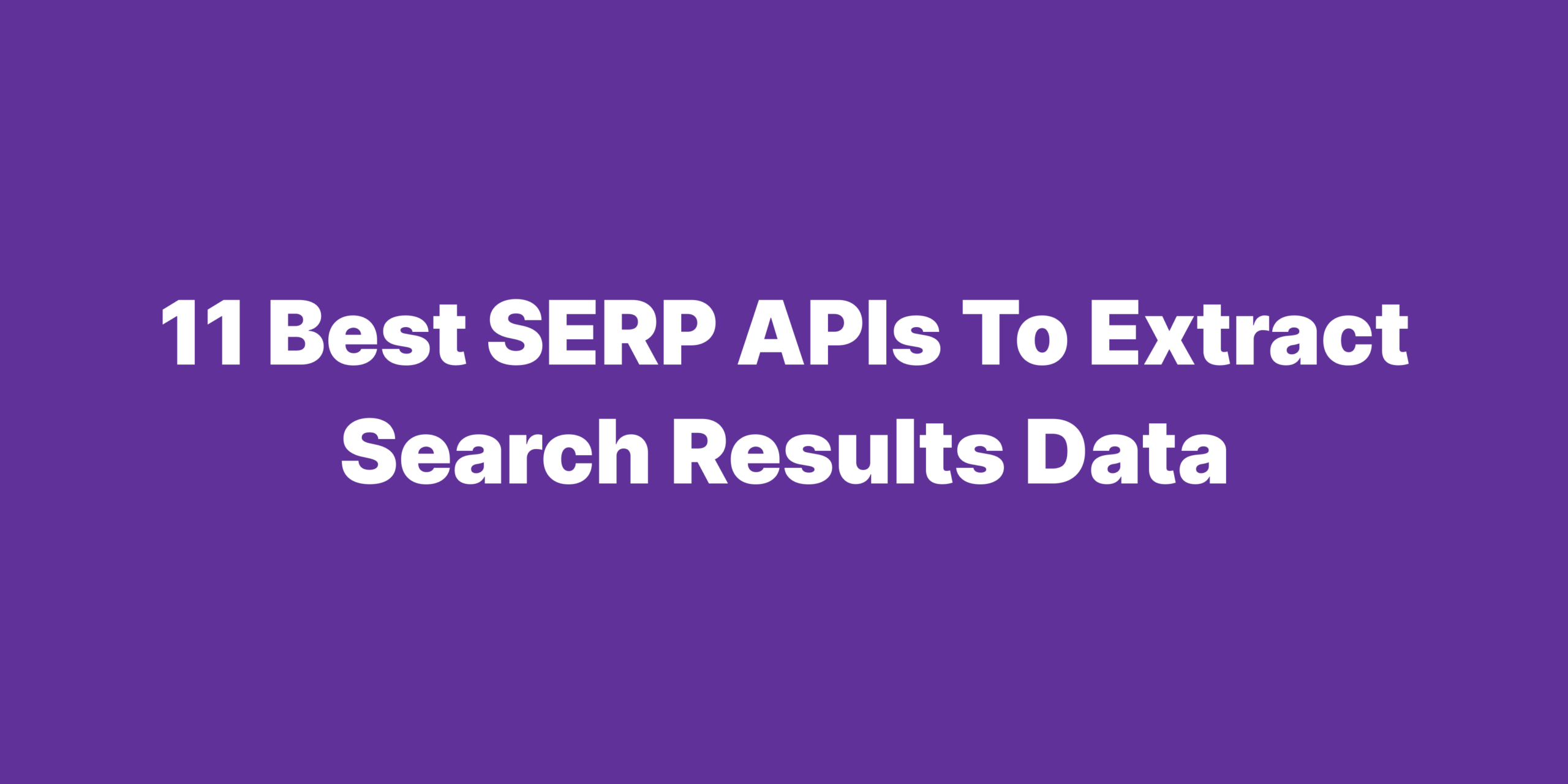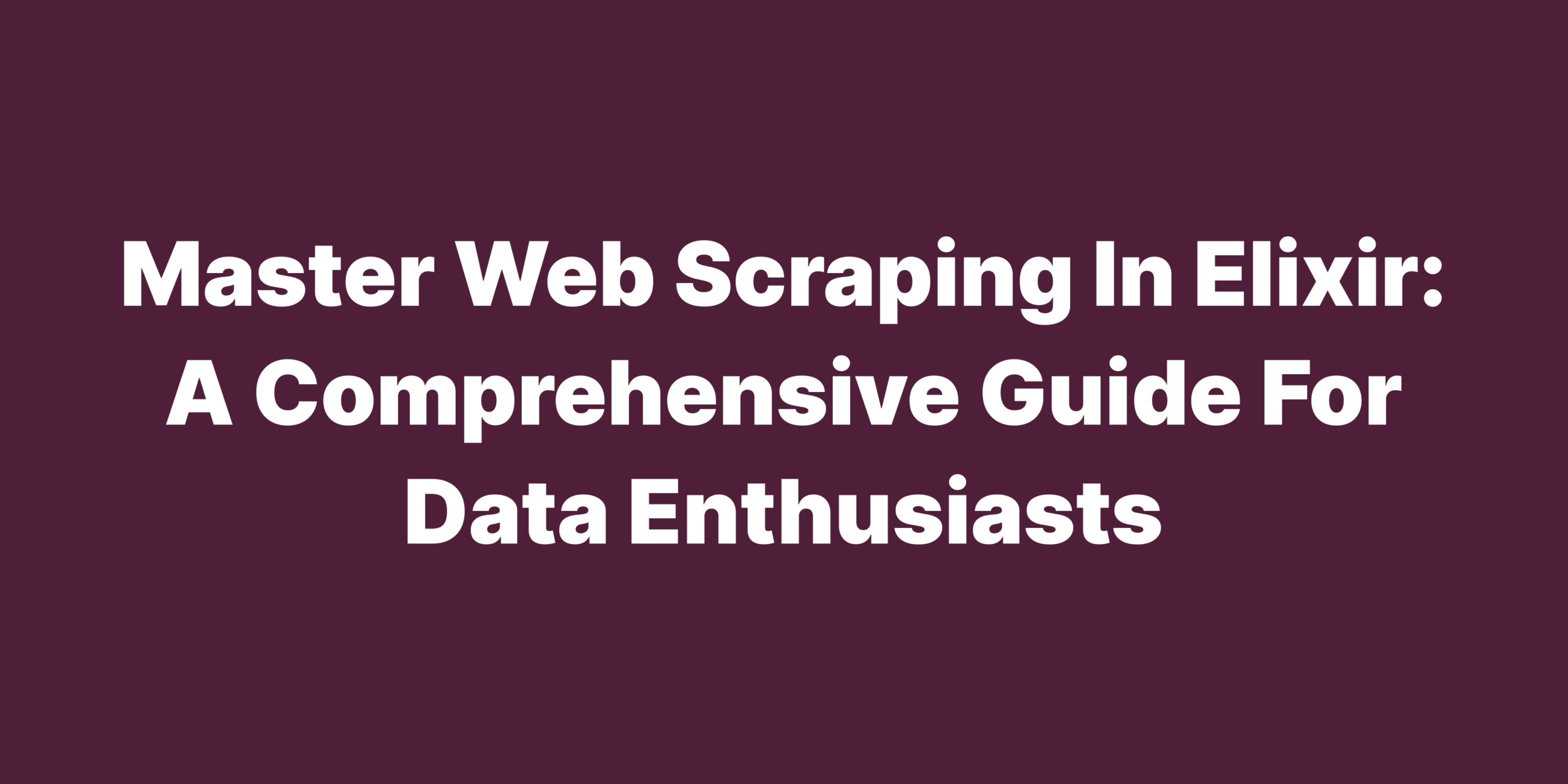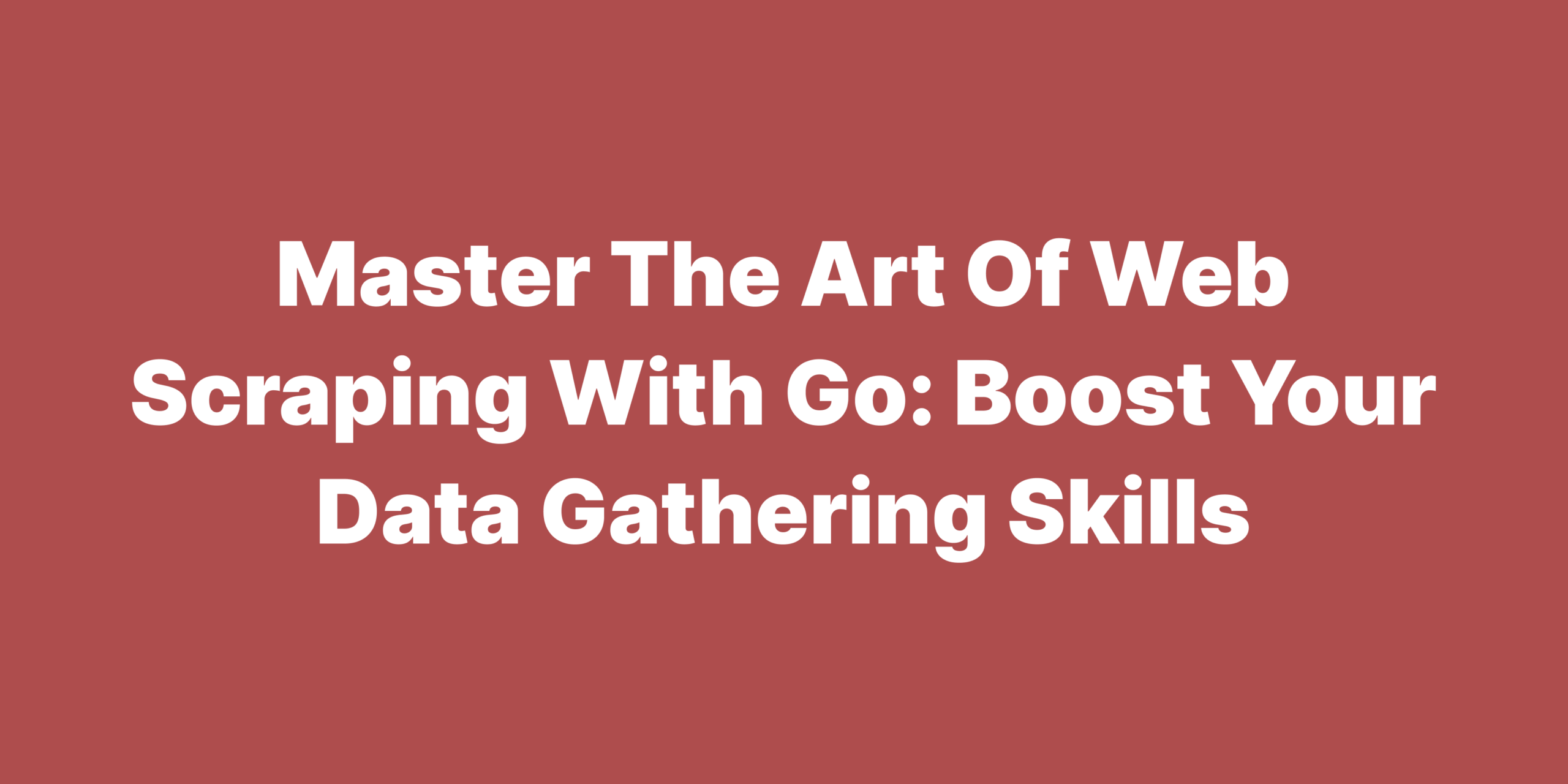Web scraping is a powerful technique that allows you to extract valuable data from websites by automating the process of gathering and analyzing information. This skill is becoming increasingly essential in the field of data analysis, as it enables data enthusiasts to gain access to large amounts of data and transform it into actionable insights. In this article, we’ll explore the exciting world of web scraping in Rust, a language known for its speed, safety, and performance. Whether you’re looking for a comprehensive web scraping API or just beginning to navigate the complexities of data extraction, we’ll discuss the importance of web scraping in data analysis, introduce you to the best libraries for Rust, and guide you through building your web scraper to extract page HTML. Additionally, we’ll share tips on how to parse HTML code using Rust libraries, ensuring you have all the tools necessary to elevate your data analysis skills.
Dive into Web Scraping with Rust: Language Overview, Environment Setup, and Fundamental Concepts
Rust is an ideal language for web scraping, thanks to its speed, reliability, and strong focus on safety. This systems programming language enables developers to write efficient, high-performance code while minimizing common bugs and errors that can occur in other languages. Rust’s syntax, which is similar to C and C++, ensures that your web scraping applications run quickly and smoothly, making it a top choice for data enthusiasts looking to scrape vast amounts of data.
Setting up the environment for web scraping in Rust is relatively straightforward. First, you’ll need to install Rust and its package manager, Cargo, by following the official installation guide. Once installed, you can create a new Rust project using Cargo, which will automatically generate the necessary files and directories for your web scraper. With your project set up, you can start adding web scraping libraries and dependencies to your project’s Cargo.toml file, allowing you to easily manage and maintain your web scraper’s functionality.
Before diving into web scraping with Rust, it’s essential to understand some basic concepts. Web scraping involves requesting web pages, downloading their HTML content, and parsing that content to extract the desired information. Familiarizing yourself with HTML tags, attributes, and structure is crucial, as this knowledge will help you navigate and extract data from web pages. Additionally, it’s important to learn about CSS selectors and XPath expressions, which can be used to target specific elements within an HTML document. With a solid grasp of these fundamental concepts, you’ll be well-equipped to start building powerful web scrapers in Rust.
Pinpoint HTML Objects by ID in Rust: Streamline Your Web Scraping Process
HTML objects, or elements, are the building blocks of a web page and play a critical role in web scraping. These elements are organized into a tree-like structure known as the Document Object Model (DOM), which can be traversed and manipulated to extract valuable data. One way to effectively target specific elements during web scraping is by identifying them using their unique IDs. In HTML, the “id” attribute is used to assign a unique identifier to an element, making it easy to locate and extract the desired data from a web page.
To identify HTML objects by ID in Rust, you’ll need to leverage one of the many web scraping libraries available. These libraries provide functions and methods that allow you to fetch web pages, parse their HTML content, and locate elements based on their unique IDs. Once you’ve identified the desired element, you can extract its content or attributes to gather the data you need. Some popular Rust libraries for web scraping include reqwest, scraper, and select, which all offer different features and capabilities to suit your specific web scraping needs.
For example, using the scraper library, you can easily identify an HTML object by its ID in Rust. First, you’ll need to fetch the web page and parse its HTML content into a document object. Next, you’ll use the find method to search for the element with the specific ID, like so: document.find(Attr("id", "target-id")).next(). This code snippet will return an iterator over the elements matching the given ID, which you can then process and extract the required data from. With this technique, you’ll be able to efficiently navigate the DOM and extract valuable information from web pages using Rust.
Discover the Top 5 Rust Libraries for Powerful Web Scraping
Rust offers a variety of powerful libraries that make web scraping more efficient and accessible. These libraries enable you to easily fetch web pages, parse HTML content, and navigate the DOM to extract valuable data. By leveraging the features and functionality provided by these libraries, you can streamline your web scraping process and build more effective Rust applications. In the next section, we’ll explore the five best libraries for web scraping in Rust, comparing their features, capabilities, and suitability for different types of projects. Stay tuned to find the perfect library for your web scraping needs!
Comparing the Top 5 Rust Libraries for Web Scraping: Pros and Cons
reqwest
reqwest is a popular Rust library for making HTTP requests, providing a high-level API that simplifies web page fetching.
Pros:
- Easy-to-use API for making HTTP requests.
- Asynchronous support, enabling efficient handling of concurrent requests.
- Wide range of features, including cookie handling, redirects, and timeouts.
Cons:
- Limited to fetching web pages and not specifically tailored for web scraping.
- Parsing HTML content requires an additional library, such as scraper or select.
- Heavier dependencies compared to other libraries, which might increase compilation times.
scraper
scraper is a Rust library designed for web scraping, providing a convenient API for parsing and traversing HTML documents.
Pros:
- Simple API for parsing and traversing HTML documents.
- CSS selector support, enabling precise targeting of elements.
- Lightweight and focused on web scraping tasks.
Cons:
- Requires a separate library, such as reqwest, for fetching web pages.
- Limited support for asynchronous operations.
- No built-in support for handling JavaScript-rendered content.
select
select is a Rust library for parsing and extracting data from HTML documents, offering both CSS selector and XPath support.
Pros:
- Supports both CSS selectors and XPath expressions for targeting elements.
- Lightweight and easy to integrate into a project.
- Good performance and memory usage.
Cons:
- Lacks built-in support for fetching web pages, requiring another library such as reqwest.
- Limited support for asynchronous operations.
- No built-in support for handling JavaScript-rendered content.
surf
surf is an asynchronous HTTP client for Rust, which can be used for fetching web pages and handling concurrent requests efficiently.
Pros:
- Asynchronous support for efficient handling of multiple requests.
- Middleware support, enabling customization and extensibility.
- Easy-to-use API for fetching web pages.
Cons:
- Not specifically tailored for web scraping tasks.
- Parsing HTML content requires an additional library, such as scraper or select.
- Limited features compared to other HTTP client libraries like reqwest.
html5ever
html5ever is an HTML parsing library for Rust, which provides a high-performance parser compatible with the HTML5 specification.
Pros:
- High-performance HTML parser, suitable for large-scale web scraping projects.
- Compatible with the HTML5 specification, ensuring accurate parsing of modern web pages.
- Flexible API, allowing for customization and integration with other libraries.
Cons:
- Steeper learning curve compared to other libraries due to its lower-level API.
- Requires a separate library, such as reqwest or surf, for fetching web pages.
- Lacks built-in support for CSS selectors or XPath expressions, necessitating additional libraries for element targeting.
Constructing Your Own Web Scraper in Rust: Tips, Steps, and Code Examples
Building a web scraper in Rust is an exciting and rewarding process that allows you to extract valuable data from websites and transform it into actionable insights. By leveraging the power of Rust and its available libraries, you can create efficient, high-performance web scrapers capable of handling vast amounts of data. In this section, we’ll guide you through the essential steps to build a web scraper in Rust and provide examples using some of the libraries mentioned earlier.
To build a web scraper in Rust, you’ll need to follow these general steps:
- Set up your Rust project and environment.
- Choose the appropriate libraries for fetching web pages, parsing HTML content, and navigating the DOM.
- Fetch the web page using an HTTP client library like reqwest or surf.
- Parse the fetched HTML content using a parsing library like scraper, select, or html5ever.
- Identify and extract the desired data from the HTML document using CSS selectors, XPath expressions, or other techniques.
- Process the extracted data and transform it into a structured format, such as JSON or CSV.
- Optionally, implement error handling, concurrency, and other advanced features to enhance your web scraper’s capabilities.
For example, let’s build a basic web scraper in Rust using the reqwest and scraper libraries to fetch a web page and extract the text content of an element with a specific ID. First, you’ll need to add the reqwest and scraper libraries to your project’s Cargo.toml file:
[dependencies]
reqwest = "0.11"
scraper = "0.12"
Next, write the following code in your project’s main.rs file:
use reqwest::Error;
use scraper::{Html, Selector};
async fn fetch_and_scrape(url: &str) -> Result<String, Error> {
let response = reqwest::get(url).await?;
let body = response.text().await?;
let document = Html::parse_document(&body);
let selector = Selector::parse("#target-id").unwrap();
let element = document.select(&selector).next().unwrap();
let content = element.text().collect::<String>();
Ok(content)
}
#[tokio::main]
async fn main() {
let url = "https://example.com";
match fetch_and_scrape(url).await {
Ok(content) => println!("Content: {}", content),
Err(error) => eprintln!("Error: {}", error),
}
}
This example demonstrates how to fetch a web page using reqwest, parse the HTML content with scraper, and extract the text content of an element with a specific ID. With this foundation, you can build more complex and powerful web scrapers to suit your data analysis needs.
Harness the Power of Rust for Web Scraping and Unveil a World of Data
In conclusion, web scraping with Rust is a powerful and efficient approach to extracting valuable data from websites, enabling you to unlock the full potential of data analysis. Throughout this article, we’ve explored Rust as a web scraping language, delved into identifying HTML objects by ID, compared the top 5 libraries for web scraping in Rust, and provided examples of how to build web scrapers and parse HTML code using these libraries. As you continue your journey in web scraping, remember that the right tools and techniques can make all the difference. To supercharge your web scraping projects, try the Scrape Network for free – we’ll handle all the proxies, captchas, and ensure you don’t get blocked, allowing you to focus on extracting valuable insights from the web.
Frequently Asked Questions
What factors are important when selecting a Rust library for web scraping? When choosing a Rust library for web scraping, consider factors such as ease of use, performance, compatibility with your project requirements, available features (such as CSS selector or XPath support), documentation quality, and community support.
What sets the top 5 Rust libraries for web scraping apart from each other? The key differences between the top 5 Rust libraries for web scraping lie in their features, performance, and ease of use. Some libraries may focus on simplicity and ease of use, while others prioritize performance and advanced functionality. The choice of library depends on your project’s specific needs and your level of expertise with Rust.
How can I stay informed about the latest advancements in web scraping libraries and best practices? To stay updated on the latest developments in web scraping libraries and best practices, follow the repositories of popular libraries on platforms like GitHub, subscribe to relevant blogs, forums, or newsletters in the web scraping community, and participate in web scraping conferences or meetups.
How does using the Scrape Network Scraping API benefit me? Leveraging the Scrape Network Scraping API helps you by managing proxies, captchas, and preventing blocks, allowing you to focus on data extraction and analysis. With our robust infrastructure, you can enjoy hassle-free and efficient web scraping. Sign up now and get 5,000 free API calls to boost your web scraping projects!






